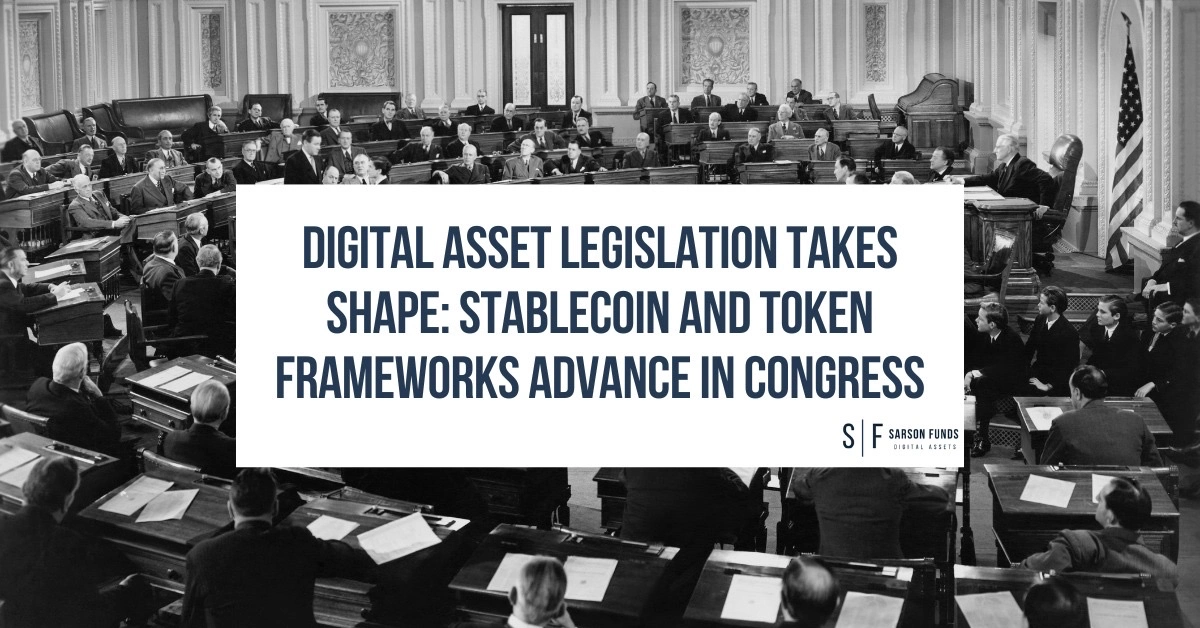
The U.S. Congress is advancing several high-profile pieces of cryptocurrency legislation, each aimed at bringing long-awaited regulatory clarity to digital assets. Among them are the GENIUS Act, recently passed by the Senate, the STABLE Act under consideration in the House, and the broader-reaching CLARITY Act, which seeks to define digital asset classifications across federal agencies. Though each bill targets a different slice of the crypto economy, together they signal the possibility of a federal framework for digital finance.
The Senate’s vote on the GENIUS Act was decisive, with 68 senators in support. However, controversy around ethics and executive involvement has emerged, along with political questions about how, and whether, these proposals can be reconciled.
GENIUS Act: Stablecoin Oversight Advances in the Senate
The Guiding and Establishing National Innovation for US Stablecoins (GENIUS) Act is designed to create a federal framework for payment stablecoins. It introduces strict requirements for asset backing, annual audits, and regulatory oversight. Issuers of stablecoins would need to ensure full 1:1 reserves in U.S. dollars or equivalent liquid assets. Entities managing over $50 billion in stablecoin supply would be subject to annual audits by independent firms. The bill also includes provisions intended to protect consumers from risk and improve transparency across the sector.
The GENIUS Act received bipartisan support. Republican Senators Bill Hagerty and Cynthia Lummis were among its primary backers, while Democrats such as Kirsten Gillibrand also supported the measure. With its passage in the Senate, attention now shifts to the House, where a similar proposal is also under review.
The STABLE Act: House Bill Shares Goals, Adds Protections
The Stablecoin Transparency and Accountability for a Better Ledger Economy (STABLE) Act is the House counterpart to GENIUS. While it overlaps in major areas such as reserve requirements and consumer protections, the STABLE Act adds several key provisions. It explicitly states that payment stablecoins are not securities, helping to clarify jurisdictional questions that have long caused friction between developers, investors, and regulators.
The bill also includes mechanisms to coordinate oversight between state and federal regulators. It strengthens consumer redress protections and outlines insolvency protocols for failed stablecoin issuers. Although it has not yet reached the House floor, the bill is moving through committee review and is expected to reemerge in some form during reconciliation efforts.
Senator Murphy’s Objection: Ethics and Executive Profit
Despite voting margins that suggest momentum, the GENIUS Act is not without its critics. Senator Chris Murphy of Connecticut has voiced strong concerns about the bill’s lack of ethics restrictions. He introduced an amendment that would bar the President, Vice President, and other senior officials from owning or profiting from stablecoin issuers. This proposal was not adopted into the final Senate version.
Murphy’s objection centers on World Liberty Financial, a stablecoin issuer linked to former President Donald Trump and his family. The Trump family holds significant stakes in WLFI, which raised over $590 million through token sales. The company promotes itself as a decentralized financial institution modeled after the Federal Reserve and is reportedly involved in the development of a new stablecoin known as USD1.
In a June 2025 statement, Senator Murphy warned that the current bill “exempts President Trump from the ethics laws on stablecoins”. He and others have argued that the bill should not proceed without additional safeguards to prevent financial conflicts of interest by top government officials.
CLARITY Act: A Framework for Token Classification
While the stablecoin debate unfolds, a third piece of legislation continues to gain support. The Clarifying Law Around Responsible Innovation and Tokenized Assets (CLARITY) Act proposes a framework to determine whether a digital asset should be treated as a security or a commodity. This bill seeks to bring consistency to an area of law that has been dominated by agency enforcement rather than statute.
The centerpiece of the CLARITY Act is a “decentralization test.” Projects that meet defined criteria—such as distributed token ownership, open-source governance, and lack of centralized control—would fall under the Commodity Futures Trading Commission, rather than the Securities and Exchange Commission. This distinction matters greatly for Web3 developers and investors, who currently face unclear or overlapping regulations.
Critics of the bill have noted that the decentralization criteria may be too easy to manipulate. Others argue that while it offers necessary legal clarity, it could unintentionally shield projects from investor protections.
What Happens Next?
With the GENIUS Act passed by the Senate and the STABLE Act gaining attention in the House, Congress has several possible paths forward:
-
-
Merge the bills into a unified stablecoin law during a conference committee process.
-
Amend the GENIUS Act in the House to add ethical restrictions or align more closely with the STABLE Act.
-
Introduce elements of the CLARITY Act into final legislation to expand the regulatory reach beyond stablecoins.
-
The politics around these bills are still fluid. Republicans have expressed interest in linking stablecoin regulation to broader digital asset reform. Democrats may resist if ethics provisions are not included. The White House has not yet issued a formal statement on whether President Trump would sign the current version of the bill.
Conclusion
The GENIUS, STABLE, and CLARITY Acts represent the most serious congressional effort to regulate cryptocurrency since Bitcoin’s creation. Whether these proposals ultimately pass will depend on negotiations around ethics, enforcement, and institutional influence. For now, the crypto industry is watching closely to see whether this legislative window becomes a turning point or another missed opportunity.
Disclosures: This article is for informational purposes only and should not be considered financial, legal, tax, or investment advice. It provides general information on cryptocurrency without accounting for individual circumstances. Sarson Funds, Inc. does not offer legal, tax, or accounting advice. Readers should consult qualified professionals before making any financial decisions. Cryptocurrency investments are volatile and carry significant risk, including potential loss of principal. Past performance is not indicative of future results. The views expressed are those of the author and do not necessarily reflect those of Sarson Funds, Inc. By using this information, you agree that Sarson Funds, Inc. is not liable for any losses or damages resulting from its use.









